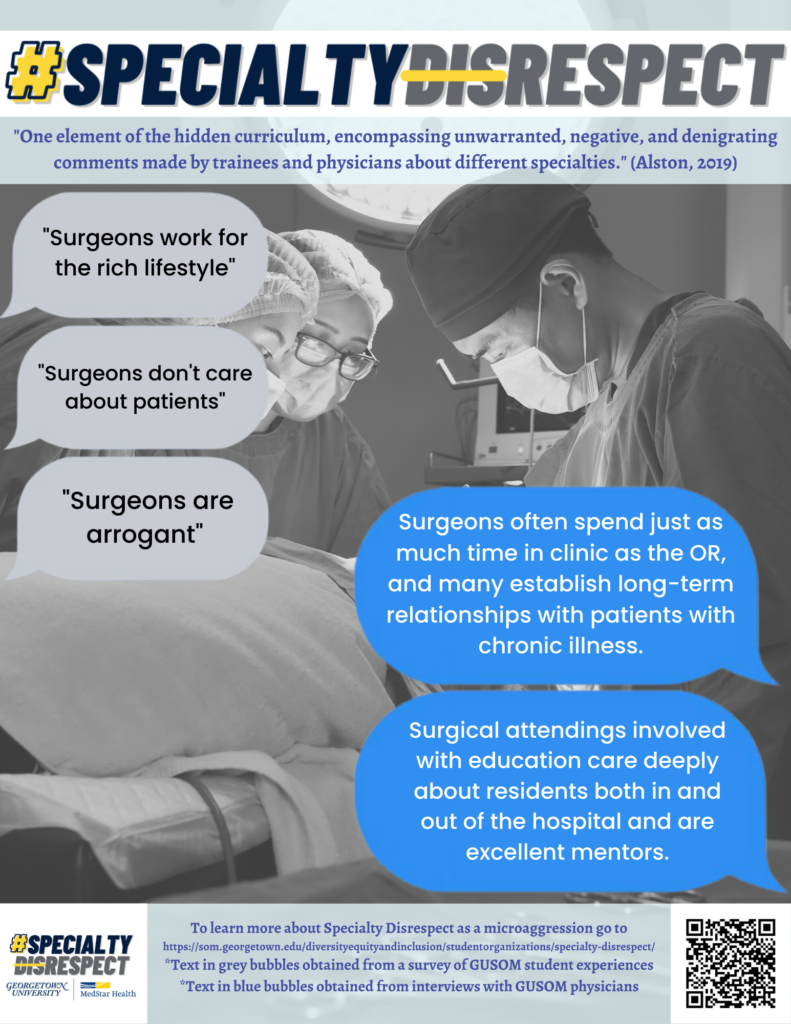Surgery

Fiction #1: “Surgeons just want to operate. They don’t care about the patient”
FACT: “In contrast to the view that surgeons are low in social skills but high in technical skills, participants from the general population (48% of whom had previously been a surgical patient) rated surgeons, as a group, as high in warmth as well as competence, relative to other non-medical occupational groups.”[1]
Fiction #2: “You’re too nice to be a surgeon”
FACT: “Another study using the Bar-On EQ-I score was conducted by Jenson et al in 2007 and looked at the emotional intelligence of surgical residents in the US. The results found that the mean scores from the surgical residents were higher than national normal values, both overall and when split into subgroup categories. The article discussed how emotional intelligence is currently highly important in the business sector, and becoming significant within healthcare settings. This article contradicts the stereotypical belief that surgeons have inadequate interpersonal skills, and instead shows that their level of emotional intelligence is better than the population average.”[2]
Fiction #3: “Only gunners who are the top of their class can become surgeons”
FACT: According to a study conducted by Indiana University, they found that data from the 2018 NRMP Match (General Surgery) yielded that the average step 1 score in this field was 236 (which correlates to approximately the 56th percentile) and the average Step 2 CK score was 248 (which approximates to the 60th percentile). Furthermore, the lowest range was a 220 for Step 1 (29th percentile) and a 230 for Step 2 CK (23rd percentile).[3]
Sources
[1] Ashton-James, Claire E, et al. “Stereotypes about Surgeon Warmth and Competence: The Role of Surgeon Gender.” PloS One, Public Library of Science, 27 Feb. 2019, www.ncbi.nlm.nih.gov/pmc/articles/PMC6392236/.
[2] Stobbs, N, and E Ward. “Do Modern-Day Surgeons Break the Stereotype and Show Emotional Intelligence in Their Leadership? .” THE ROYAL COLLEGE OF SURGEONS OF ENGLAND BULLETIN , THE ROYAL COLLEGE OF SURGEONS OF ENGLAND , 2014, publishing.rcseng.ac.uk/doi/pdf/10.1308/147363514X14042954768592
[3] Rendina , Megan. “General Surgery.” Indiana University School of Medicine , Indiana University School of Medicine , 2018, md.mednet.iu.edu/wp-content/uploads/2021/02/Surgery-Final.pdf.
Read text version of this poster
[Background is in black and white and is image of surgeons operating on patient]
[Top header in light blue. Text in navy]
“Specialty Disrespect” in bold at the top. Underneath this title reads “Specialty Disrespect (SD) is an element of the hidden curriculum, encompassing unwarranted, negative, and denigrating comments made by trainees and physicians about different specialties. SD affects all specialties, touching most medical students by graduation (Alston, 2019).”
Poster that mimics an iphone messaging screen with fictional statements as receiving grey message bubbles and factual statements as sent blue message bubbles. This poster is about surgery. The fictional side has three bubbles in a row and reads “Surgeons work for the rich lifestyle”, “surgeons don’t care about patients”, and “Surgeons are arrogant”. The factual response has two bubbles and reads “surgeons often spend just as much time in the clinic as the OR, and many establish long-term relationships with patients with chronic illness” and “Surgical attendings involved with education care deeply about residents both in and out of the hospital and are excellent mentors”
[Bottom header in light blue. Text in navy]
On the left is the dark blue Office of Diversity and Inclusion Logo. On the right is a QR code that links to this webpage (som.georgetown.edu/specialty-respect). In the middle is “To learn more about SD as a microaggression go to som.georgetown.edu/specialty-respect”
